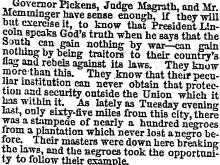Interesting from Charleston—Three Classes of Politicians.
The Charleston correspondent of the Philadelphia Inquirer, writes on the 7th:
The population of this city are now divided into three parties. The first and loudest are the followers of the immortal Brooks, disciples of the chivalrous Rhett, men who forgetting the patriots of the revolution and the glories of their achievements on behalf of the whole country, have degenerated from Americans into mere South Carolinians–men who proclaim aloud, as I heard a maniacal individual, who bunks in an engine house, do last night–that the State was his God. These may be termed fire-eaters, indeed. The second class are composed of men of a higher order of intellect, who, though at present think themselves Secessionists, are still yearning in their hearts for reconstruction as the only safeguard of their rights, their property and their homes. You may set down Mr. Memminger, the president Secretary of the Treasury at Montgomery, as a representative man of this class. At the head of the third class you may place that good old American gentleman, Mr. Pettigru–the ablest lawyer and the greatest wit of whom the Cotton States can boast. The rank and file are merchants, clerks, and mechanics, who are, in the deep recesses of their hearts, true to their country, to freedom, and to the memories of Independence Hall. Many of them, I mourn to say, have bowed the knee to Baal, urged by the exigencies of their own position, and the dependence of their families for support on labor, which they have to perform for the two former classes.
Governor Pickens, Judge Magrath, and Mr. Memminger have sense enough, if they will but exercise it, to know that President Lincoln speaks God’s truth when he says that the South can gain nothing by war–can gain nothing by being traitors to their country’s flag and rebels against its laws. They know more than this. They know that their peculiar institution can never obtain that protection and security outside the Union which it has within it. As lately as Tuesday evening last, only sixty-five miles from this city, there was a stampede of nearly a hundred negroes from a plantation which never lost a negro before. Their masters were down here breaking the laws, and the negroes took the opportunity to follow their example.
"Interesting from Charleston," Chicago (IL) Daily Tribune, March 15, 1861, p. 3.

